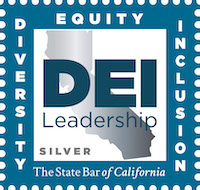Ventura attorney Lauren Nicholson joins The Colleges of Law, focusing on the mission of access, opportunity, and affordability.
SANTA BARBARA & VENTURA – Lauren Nicholson (J.D. ’17) is the newest member of The Colleges of Law Board of Trustees. A graduate of the school’s Ventura campus, Nicholson joins the 15-member governance body that oversees the region’s oldest and largest independent law school.
Nicholson currently serves as president of the Women Lawyers of Ventura County, advocating on behalf of women and girls in the local community. She is also a board member at large for the Ventura County Family Law Bar Association, organizing local continuing legal education opportunities and contributing to the local family law community. Nicholson regularly volunteers with the Ventura County Superior Court as a Settlement Officer, acting as a neutral guide to help family law litigants understand the strengths and weaknesses of their cases and discuss settlements, and she is a volunteer attorney at the Conejo Free Clinic, providing free legal services to litigants in need of family law assistance.
“I am honored to be joining the Board of Trustees,” said Nicholson. “The Colleges of Law is a wonderful law school. It provided me with an opportunity to study under professors who were accomplished lawyers and judges. I am proud to call it my alma mater and give back though board service.”
Nicholson brings extensive knowledge of The Colleges of Law’s academia to her appointment. She was ranked first in her graduating class in 2017, with concentrations in Business Law and Family Law, and has also served as adjunct faculty at the college where she taught classes such as Litigation: An Overview of Processes and Procedures, Bar Studies, Legal Writing, and Remedies.
“The Board made an inspired choice with electing Lauren as a trustee and fiduciary,” said The Colleges of Law President Matthew Nehmer, Ph.D. “As someone who knows and lives our mission, she is sure to make a difference in realizing our vision of modernizing legal education through innovation and better preparing graduates for where the field goes next.”
The Colleges of Law Board Chair Jana Johnston (J.D. ’03) agreed. “By adding Lauren, we took what was already an excellent and engaged Board and made it better,” she said. “She will bring distinct perspectives to our work as a proud alumna, past faculty member, and rising star in the Ventura legal community.”
Prior to The Colleges of Law, Nicholson earned a Bachelor of Arts in English from California State University, Fresno, and a Master of Arts in English from California State University, Bakersfield. Nicholson currently owns a solo practice in Ventura where she works as a family law attorney dealing with uncontested and contested dissolutions and legal separations, divorce mediation, division of marital property, child support, child custody, paternity, domestic partnerships, and domestic violence restraining orders.
About The Colleges of Law:
Established in 1969, The Colleges of Law was founded to expand opportunities and broaden access to legal education. The Colleges of Law is dedicated to a student-centered approach that affords students of diverse backgrounds the opportunity to pursue careers in law or legal-related fields. The college’s faculty advances a real-world perspective and practicality on the application of law and includes practicing attorneys, judges, public servants, and leaders in business and nonprofit organizations. An accredited nonprofit institution, The Colleges Law offers a Juris Doctor and a Master of Arts in Law. Additionally, in the fall of 2018, The Colleges of Law became the first accredited law school in California to offer a Hybrid J.D. degree.
The Colleges of Law is accredited by the WASC Senior College and University Commission (WSCUC). The Juris Doctor program is accredited by the Committee of Bar Examiners (CBE) of the State Bar of California. The Colleges of Law is part of The Community Solution Education System, a nonprofit system of colleges advancing student success and community impact. For more information, visit www.collegesoflaw.edu.

